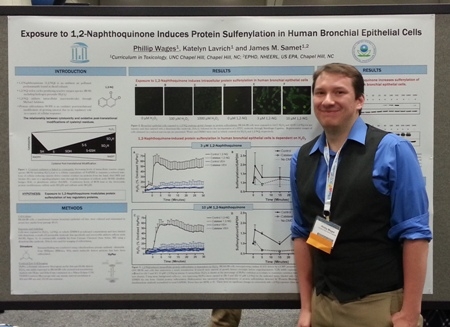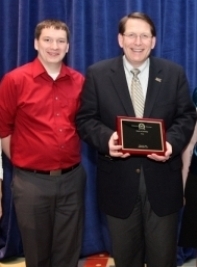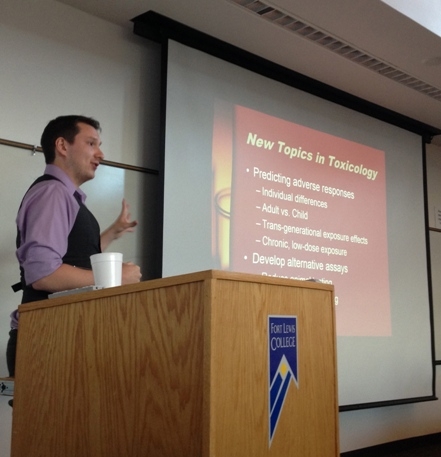It only took one week with a passionate educator to inspire one person towards an exciting and productive career in toxicology. Most SOT members acknowledge that they first discovered toxicology during graduate school or even later, but my path as a toxicologist started in high school in a 2005 summer workshop taught by Karen Stine at Ashland University. Within a decade after that week, I have two toxicology degrees, am in a postdoc position, and am involved in SOT. I am acknowledging that many SOT-sponsored programs and SOT members have helped me along the way by describing my path.

Phillip Wages presents his research at the 2016 Annual Meeting.
During the workshop, Dr. Stine’s excitement, passion, and engaged teaching ignited my interest for toxicology, leading me to attend Ashland University, a small liberal arts institution in Ohio, just so I could learn more about toxicology. And, indeed I did learn about toxicology in the classroom from Dr. Douglas Dawson and with site visits to the local contract research organization, WIL Research, hosted by Mr. Bennet Varsho.
Dr. Stine, now at Auburn University at Montgomery and an active member of SOT, encouraged me to get involved with the organization. I took the advice and attended the SOT Undergraduate Education Program at the 2009 SOT Annual Meeting. This was a pivotal moment—as this was not only my first time at a scientific conference—but also it was where I saw one of the most memorable and inspiring presentations in my life given by Dr. Martin Philbert showing how toxicology could be used to improve human health.

SOT 2011–2012 President Jon C. Cook (right) presents Dr. Wages with one of the Pfizer Awards conferred at the 2011 SOT Annual Meeting
Following this meeting, I focused even more of my time towards toxicology and began working on a research project with the guidance of Drs. Andrew Trimble and Mason Posner, examining the effect of pesticide mixtures on zebrafish. This abstract was the basis for the application that resulted in my receiving one of the Pfizer Undergraduate Student Travel Awards at the 50th SOT Annual Meeting. Although it was an honor to receive such an award, the opportunity to present at the meeting was even more exciting. If Dr. Stine ignited my interest, presenting at SOT as an undergraduate fueled it to pursue even deeper into the field: that meant graduate school.
I was accepted into the University of North Carolina at Chapel Hill (UNC), where I not too surprisingly joined the Curriculum in Toxicology. Interestingly, this program was the same one from which Dr. Stine had graduated. At UNC I worked under the direction of Dr. James Samet of the US Environmental Protection Agency elucidating new mechanisms through which exposure to air pollution could impact human health. Through regional and national SOT events, I met many other toxicologists who became important mentors to me. Dr. Urmila Kodavanti, a member on my thesis committee, challenged me to be an innovative scientist, and Drs. Ilona Jaspers and Dana Dolinoy became role models for being leaders and advocates in toxicology.

Dr. Wages shares the importance of toxicology during an SOT ToxScholar visit to Fort Lewis College.
In fact, I myself advocated for toxicology in many ways, including serving as an SOT ToxScholar for a visit to Fort Lewis College in Colorado at the invitation of a former Ashland University professor Dr. Steven Fenster. During this visit, I met with both faculty and undergraduates and discussed the wide-range of opportunities available in the field of toxicology. This, in part, led Dr. Fenster to attend the most recent SOT Annual Meeting as part of the Undergraduate Program. All of the experiences at UNC and with SOT maintained my enthusiasm for the field, ultimately culminating in the completion of my graduate studies in 2015 when I obtained a doctorate in toxicology and began my current postdoctoral position at Vanderbilt University in Dr. Ned Porter's lab. I also am continuing my involvement in the institutional toxicology program under the direction of Dr. Aaron Bowman.
I am indebted to the SOT-sponsored programs and the many members of SOT who have helped me on my way to a career in toxicology, particularly for Dr. Stine's continued mentorship and encouragement upon introducing me to this truly worthwhile field.